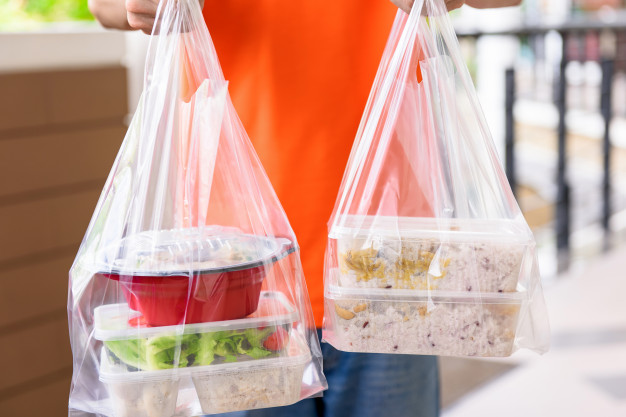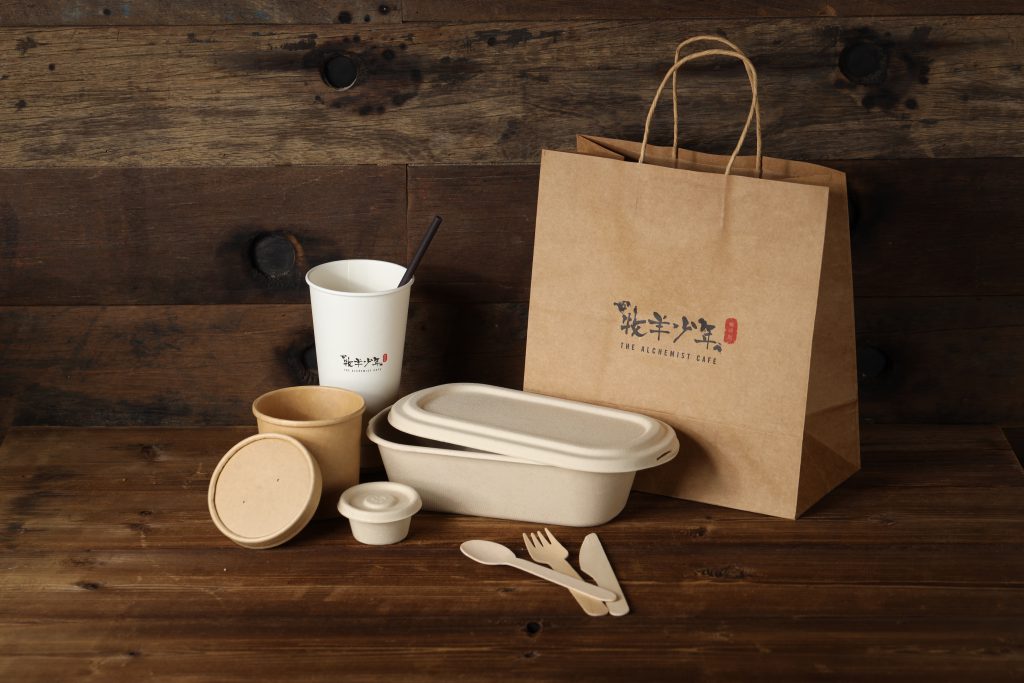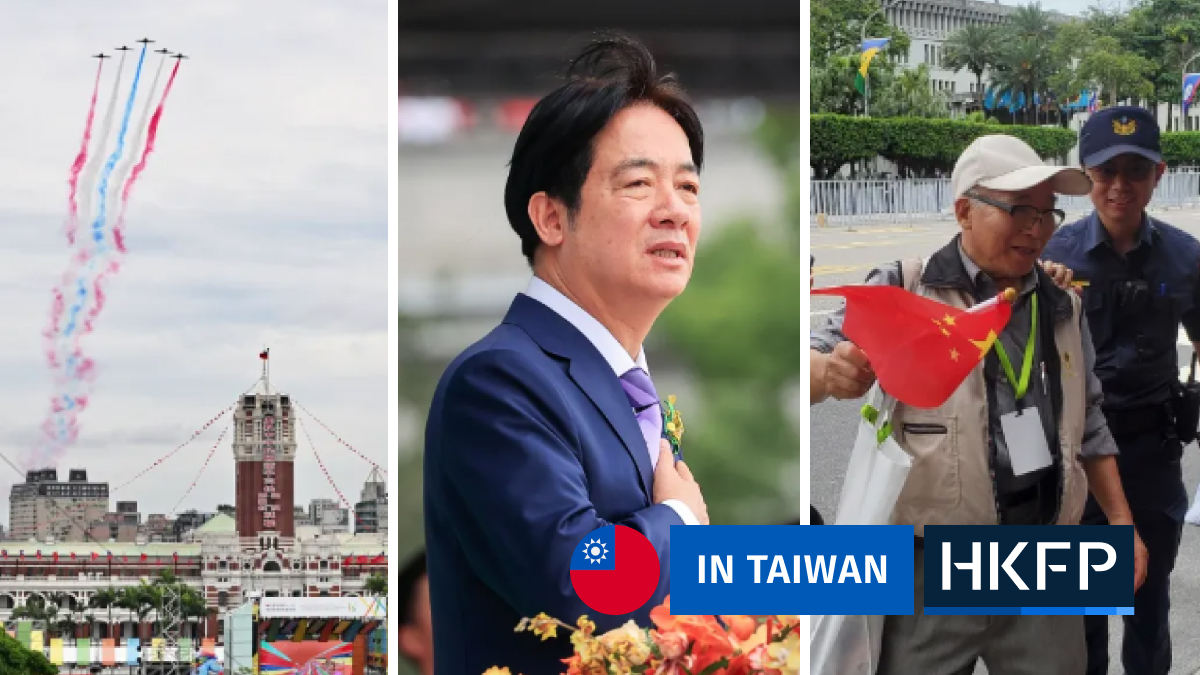By Fiona Cheung, Kassandra Lai and Kayi Tsang
A student in a traditional blue cheongsam waited in a long queue outside a restaurant. While other students returned to school with their lunch in a white styrofoam box, she handed over her own lunchbox to a hesitant waitress after ordering a takeaway.
Emily Cheung Yee-kwan, 18, was one of only few pupils in her school to do so.

“I was taught to avoid using disposable plastics,” Cheung said. “So I bring my containers as I feel uncomfortable and guilty knowing that single-use plastic ones are going to end up in the landfill for years.”
It takes 500 years for some plastics in landfill sites to decompose, according to Friends of the Earth.
According to data from the Environmental Protection Department in 2018, plastics made up 21 per cent of Hong Kong’s municipal solid waste with an average 2,343 tonnes per day being dumped. Almost nine per cent of this was plastic or polyfoam dining ware.
People carrying takeaway food in several plastic containers, however, has become an even more common sight in Hong Kong since the arrival of Covid-19.
The government announced its first dining restrictions on March 27, and the regulations have been eased and reintroduced a few times since then. As of late November restaurants must operate at only half capacity with no more than four persons per table.

Amid the uncertainty many restaurants have rolled out takeaway or food delivery services. Foodpanda, for example, has seen a 50 per cent increase in demand in Hong Kong for takeaway food and grocery delivery services.
The health crisis seems to have derailed efforts to reduce plastic waste and left many campaigners frustrated.
“I feel alone and not supported because none of my schoolmates do the same [bring their own containers] and some restaurants don’t understand or feel annoyed,” Cheung said.
Seeking alternatives
Noticing the severity of the plastic waste problem, some businesses in Hong Kong are seeking solutions. Jorch Wong Ching-hei, founder of a recycling business started in late 2019, sees a loophole in the recycling chain: bins which are haphazardly filled up.
“Most Hong Kong people don’t know what is recyclable so they put everything in it, including diapers and masks,” he said. To prevent recyclable items from going to waste, his company, The Loops, collects plastics directly from homes and sorts waste before taking it to recycling plants.
“We saw plastic use jump by 50 per cent when dining in restaurants was banned all day,” he said.

As of late September, The Loops had hundreds of customers in Tseung Kwan O, the only district in which it operates. “Up to now we have recycled about 1.5 tonnes of plastics and we are seeing an increasing trend,” he said. The company hopes to expand to other districts in the future.
Recycling aside, some restaurants try to eliminate plastic waste by finding eco-friendlier alternative materials.
The Alchemist Cafe, founded by Dylan Leung Tik-lun in October 2012, has been looking for more environmentally-friendly substitutes for three years. “Plastics are definitely more economic, but just one straw will take hundreds of years to decompose in the landfill,” Leung said. “So we insist to opt for a greener option.”
Reaction from customers has been favourable. “I think the majority of customers support and appreciate our decision,” Leung said. “In fact, I found them very tolerant to situations like straws made of rice becoming soggy after a while.”

Apart from finding disposable alternatives, Yvonne Leung Yee-wan from Space Cafe and Kitchen believes reusable containers are a solution. Since mid-March, the restaurant has been providing discounts to customers who bring their own dining ware and offering a tableware rental service for takeaways.
“We collect $50 deposit from our customers for every reusable lunch box and they can return it anytime at their convenience. At least one customer would rent a lunch box per day,” Yvonne Leung said. “We make the environment our priority.”
Plastic ACTion initiative
As some businesses strive to minimise plastic waste, WWF Hong Kong in March launched the Plastic ACTion Initiative (PACT) to target the entire food industry.
Leading food delivery companies in Hong Kong including Deliveroo and foodpanda, which account for about 90 per cent of market share, have signed an industry-wide pledge to eliminate plastics by 2025.
Apart from a default cutlery opt-out option, foodpanda said it was working with global and local suppliers to source sustainable packaging for its merchants and restaurants to use in the future.
June Wong, from WWF, believes the government should also step up efforts to combat the city’s plastic waste problem.
“Hong Kong lags behind when it comes to plastic waste legislation,” Wong said. The ban on free plastic shopping bags in stores which came into force in 2015 had proved legislation could be effective, she said.

“The amount of plastic bags disposed of at landfills plummeted,” Wong said. “Legislation could definitely help reduce plastic waste effectively… and it could also arouse public awareness.” According to the Environmental Protection Department (EPD) , the number of plastic bags in landfills decreased from some 660 million before the implementation of the scheme to some 150 million one year afterwards.
Chief Executive Carrie Lam stated in her policy address in 2018 that the government would “study the feasibility, scope and mechanism of controlling or banning disposable plastic tableware.”
The EPD said it was studying proposals suitable for Hong Kong and the study was expected to be completed by the end of 2020.
Wong would welcome legislation on the use of plastic dining ware but also urged the government to help with the cost of a transition.
“If disposable plastic tableware is to be banned in Hong Kong, the government has to provide financial support to the industry during the transition period,” she said.
Support HKFP | Policies & Ethics | Error/typo? | Contact Us | Newsletter | Transparency & Annual Report | Apps
Help safeguard press freedom & keep HKFP free for all readers by supporting our team

LATEST FROM HKFP
HKFP has an impartial stance, transparent funding, and balanced coverage guided by an Ethics Code and Corrections Policy.
Support press freedom & help us surpass 1,000 monthly Patrons: 100% independent, governed by an ethics code & not-for-profit.










